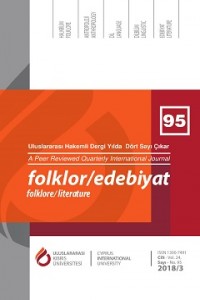Öz
Intersemiotic approaches in different fields of social sciences reveal resourceful
insights on different fields of study, enabling an interdisciplinary approach.
In this vein, it is a recent and innovative approach in Translation Studies
to elaborate on the city as a source text, where the depictions of the author
are read as a form of translation. In this framework, the texts written on a
particular city are analyzed as intersemiotic translations of the relevant spatial
site. The translation process includes the rendering of the visual elements
into verbal depictions, and each depiction and narration is claimed to provide
a new perspective and translation of the city. Within this framework, I will
provide a translation-oriented analysis of four literary works, Huzur and Beş
Şehir- İstanbul by Ahmet Hamdi Tanpınar and İstanbul, Hatıralar ve Şehir
and Kafamda Bir Tuhaflık by Orhan Pamuk, all of which and both of whom
are defined as narrations of Istanbul and authors of Istanbul respectively. I claim that each of these literary works provides a different representation of
Istanbul with respect to the spatial and temporal loci of focus, and accordingly,
provide differing translations of the same city. The focus of the study will
be on the representations of Istanbul, differences and similarities between the
images used, the common and differing paradigms, revealing the particular
concentrations of each author. Also, the social and political trajectories,
and thematic concentrations, governing the narrations within the relevant
literary works, will be elaborated within the complex network of relations of
Translation Studies.
Anahtar Kelimeler
intersemiotic translation Literature city translation Istanbul
Kaynakça
- Aguiar, D. and Joao Queiroz. (2009) Towards a model of intersemiotic translation. The International Journal of the Arts in Society, v.4. https://www.academia.edu/380053/Towards-a-model-of-intersemiotic-translation
- Demirkol, Ş. (2010) The city and its translators: Istanbul metonymized and refracted in the literary narratives of Ahmet Hamdi Tanpınar and Orhan Pamuk in Turkish, English and French. Ph.D. Thesis. İstanbul: Bogazici University.
- Jakobson, R. (2000) On linguistic aspects of translation. In The Translation Studies Reader, Lawrence V. (ed.), 113-118. London/New York: Routledge.
- Pamuk, O. (2003) 2014. İstanbul, hatıralar ve şehir. İstanbul: YKY.
- Pamuk O. (2014) Kafamda bir tuhaflık. İstanbul: YKY.
- Seyhan, A. (2008) Tale of crossed destinies: The tale of modern Turkish novel in a comparative context. New York: Modern Language Association of Amerika.
- Tanpınar, A. H. (1946) 2014. Beş şehir- İstanbul. Istanbul: Dergah.
- Tanpınar, A. H. (1949) 2014. Huzur. Istanbul: Dergah.
- Torop, P. (2002) Translation as translating as culture. Sign System Studies 30 (2): 593-605.
- Torop, P. (2007) Methodological remarks on the study of translation and translating. Semiotica 163 (1/4): 347-364. Tymoczko, M.. (1995) The metonymics of translating marginalized texts, Comparative Literature, v. 47 (1) (Winter), p.11-24.
- Tymoczko, M. (1999) Translation in a postcolonial context. Manchester: St. Jerome.
Ayrıntılar
| Birincil Dil | İngilizce |
|---|---|
| Konular | Dilbilim, Sanat ve Edebiyat |
| Bölüm | Derleme Makaleleri -Compilation Articles |
| Yazarlar | |
| Yayımlanma Tarihi | 1 Ağustos 2018 |
| Yayımlandığı Sayı | Yıl 2018 Cilt: 24 Sayı: 95 |
Derginin yayım dili Türkçe ve İngilizce’dir, ayrıca Türkçe de olsa tüm basılan makalelerin başlık, öz ve anahtar sözcükleri İngilizce olarak da makalede bulunur. Hakemlerden onay almış Türkçe makaleler için 750-1000 sözcükten oluşan genişletilmiş özet (extended summary) gereklidir. Elektronik çeviriler kabul edilmez.
Dergi TR-Dizin, Web of Science (ESCI), DOAJ ile diğer pek çok dizin tarafından taranmaktadır. Scimagoe quartile değeri: Q2 'dir:
TR DIZIN 2020 Etik Kriterleri kapsamında, dergimize 2020 yılından itibaren etik kurul izni gerektiren çalışmalar için makalenin yöntem bölümünde ilgili Etik Kurul Onayı ile ilgili bilgilere (kurul-tarih-sayı) yer verilmesi gerekecektir. Bu nedenle dergimize makale gönderecek olan yazarlarımızın ilgili kriteri göz önünde bulundurarak makalelerini düzenlemeleri önemle rica olunur.
Alan Editörleri/ Field Editörs
Halkbilimi/Folklore
Prof.Dr. Hande Birkalan-Gedik (JohannWolfgang-Goethe İniversitet-birkalan-gedik@m.uni-frankfurt.de)
Prof.Dr. Ali Yakıcı (Gazi Üniversitesi-yakici@gazi.edu.tr)
Prof.Dr. Aynur Koçak (Yıldız Teknik Üniversitesi-nurkocak@yildiz.edu.tr)
Prof.Dr. Işıl Altun (Regensburg Üniversitesi/Kocaeli Üniversitesi-İsil.Altun@zsk.uni-regensburg.de)
Doç.Dr. Ahmet Keskin (Samsun Üniversitesi-ahmet.keskin@samsun.edu.tr)
Edebiyat/Literature
Prof.Dr. Abdullah Uçman (Mimar Sinan Güzel Sanatlar Üniversitesi -emekli-29 MayısÜniversitesi-abdullahucman@29mayis.edu.tr
Prof. Dr. Ramazan Korkmaz (Ardahan Üniversitesi-emekli-Kafkasya Üniversiteler Birliği -KÜNİB-r_korkmaz@hotmail.com)
Prof.Dr. Emel Kefeli (Marmara Üniversitesi-emekli-İstanbul 29 Mayıs Üniversitesi-ayseemelkefeli @gmail.com)
Prof.Dr. Zekiye Antakyalıoğlu ( İstanbul Aydın Üniversitesi-zekabe@hotmail.com)
Antropoloji/Anthropology
Prof.Dr. Hanife Aliefendioğlu (Doğu Akdeniz Üniversitesi-hanife.aliefendioglu@emu.edu.tr)
Prof. Dr. Şebnem Pala Güzel (Başkent Üniversitesi-sebnempa@baskent.edu.tr)
Prof.Dr. Derya Atamtürk Duyar (İstanbul Üniversitesi-datamturk@istanbul.edu.tr)
Prof.Dr. Meryem Bulut (Ankara Üniversitesi-meryem.bulut@gmail.com)
Dil-Dilbilim/Language-Linguistics
Prof.Dr. Nurettin Demir (Hacettepe Üniversitesi-demir@hacettepe.edu.tr)
Prof. Dr. Aysu Erden (Maltepe Üniversitesi-aysuerden777@gmail.com)
Prof.Dr. Sema Aslan Demir (Hacettepe Üniversitesi-semaaslan@hacettepe.edu.tr)


